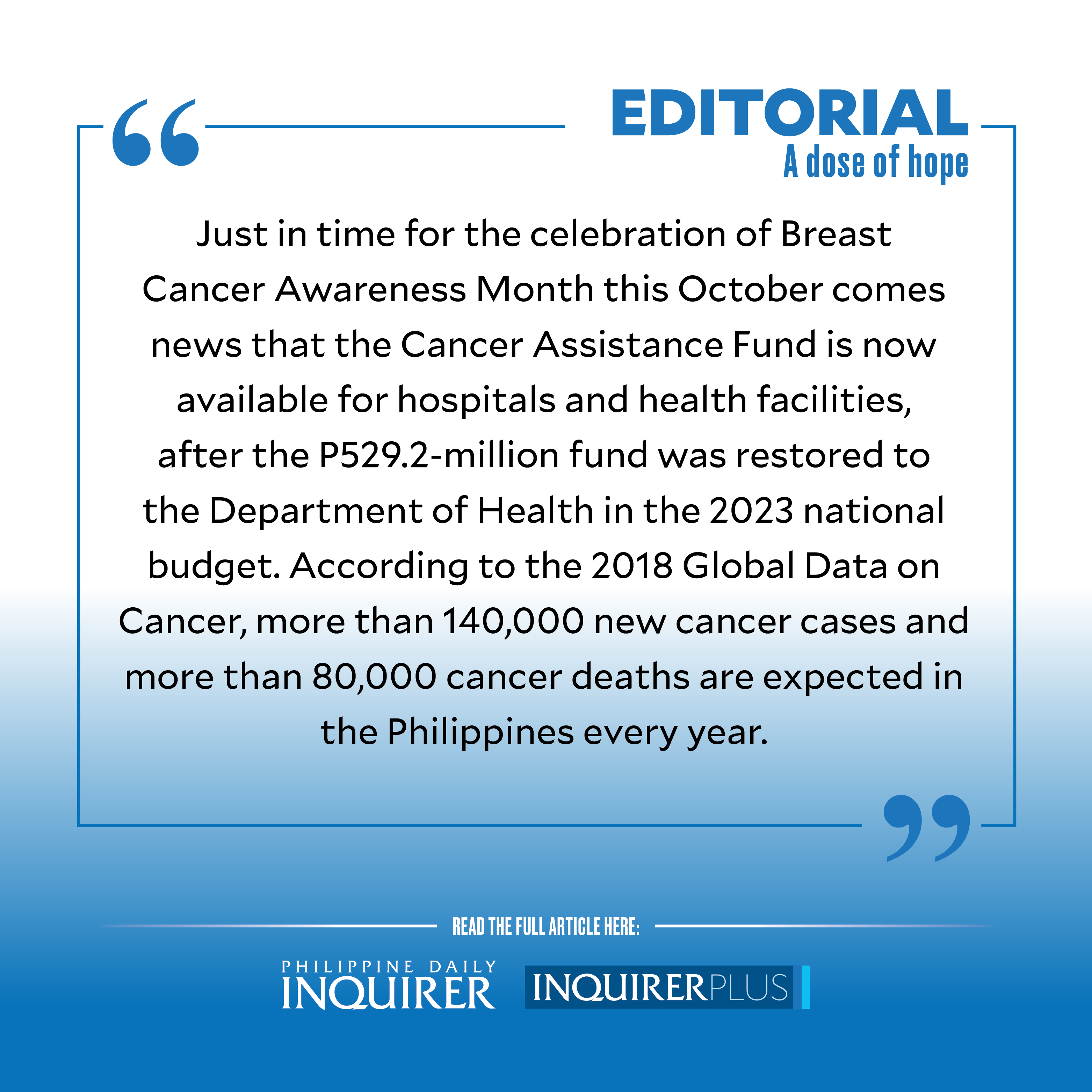A dose of hope
Just in time for the celebration of Breast Cancer Awareness Month this October comes news that the Cancer Assistance Fund (CAF) is now available for hospitals and health facilities, after the P529.2-million fund was restored to the Department of Health (DOH) in the 2023 national budget.
Under Joint Memorandum Circular No. 2022-0002 released on Sept. 28 by the DOH and the Department of Budget and Management (DBM), the CAF will be used for outpatient and inpatient cancer control services including, but not limited to, therapeutic procedures, medicines needed for cancer treatment and management, and other care-related components. Also covered are laboratory and diagnostics costs, especially for the eight priority cancer types such as breast, childhood, gynecologic, liver, adult blood, head and neck, and prostate, renal, and urinary.
A special provision in the 2022 DOH budget had allotted the fund as part of the government’s cancer control program in accordance with Republic Act No. 11215, or the National Integrated Cancer Control Act (NICCA), signed by then President Rodrigo Duterte on Feb. 19, 2019.
DOH officer in charge Ma. Rosario Vergeire said RA 11215 was not fully implemented in 2022 due to “contradicting provisions” in the General Appropriations Act. The line item for the fund was subsequently omitted from the DBM’s National Expenditure Program, but was restored upon appeal by Vergeire, and after the two agencies crafted a joint circular resolving the initial issue and providing guidelines for the use of the CAF.
In a statement, Budget Secretary Amenah Pangandaman said cancer-stricken Filipinos can now use the fund to access DOH health facilities and other medical providers in the country. “We hope that (the CAF) will ease the burden of many cancer patients, as we know that cancer is one of the leading causes of morbidity and mortality amongst Filipinos,” she added. Government data have shown cancer to be the third leading cause of death in the country, after heart and vascular diseases, accounting for 8,926 recorded fatalities from January to March 2022.
According to the 2018 Global Data on Cancer, more than 140,000 new cancer cases and more than 80,000 cancer deaths are expected in the Philippines every year. Some 4,000 of the projected new cases will be in the pediatric age group. The most common cancer among Filipinos is breast, followed by lung, colon, liver, and prostate. Lung cancer is the leading cause of death among all cancers, followed by liver, breast, colon, and leukemia.
While several public health mechanisms supporting cancer control services are being implemented, including early screening and detection procedures, hospitalization benefits, and access to free cancer medication, out-of-pocket expenditures in cancer care remain high. The CAF is meant to complement existing financial support for cancer interventions that are not yet covered by the Philippine Health Insurance Corp. (PhilHealth).
The CAF, which will be available until Dec. 31, 2023, will be managed by the DOH and will be provided through a sub-allotment mechanism to DOH hospitals and through fund-transfer for non-DOH medical facilities.
Cancer patients can also refer to RA 11215 or NICCA to demand better access to more responsive and affordable health care services, as well as mandated social protection in schools and workplaces.
Under Article V, Section 21 of the law, “The Philippine Health Insurance Corporation shall expand its benefit packages to include primary care screening, detection, diagnosis, treatment assistance, supportive care, survivorship follow-up care rehabilitation, and end-of-life care, for all types and stages of cancer, in both adults and children.”
According to the law, “a Cancer Control Policy shall be established in every workplace [as] part of employee benefits in the formal sector covering the entire cancer continuum, from prevention, including genetic counseling and testing, to screening, diagnosis and palliative care, treatment, rehabilitation, survivorship or hospice care.”
Cancer-related absences from work of member employees, as well as voluntary members, “shall be covered and compensated by the Sickness Benefits of the SSS and Disability Benefits of the GSIS.” At the same time, “employees in the informal sector shall be prioritized in the cancer control packages of PhilHealth, while employees in the formal sector shall be offered cost-sharing PhilHealth benefit packages.”
While the DOH must be commended for its efforts to restore the CAF in the 2023 budget, the agency must work as hard to ensure the speedy and proper implementation of RA 11215. It must also pursue a more aggressive awareness campaign on cancer to address the myths and stigma that have discouraged people from seeking early diagnosis and treatment. By delivering a message of hope and recovery and providing the wherewithal for them through the CAF, the government would have served one of the most afflicted sectors in dire need of help and intervention.





















